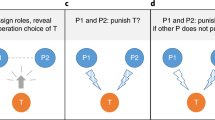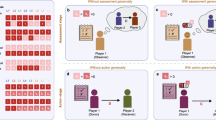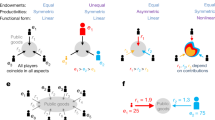Abstract
Social cooperation often requires collectively beneficial but individually costly restraint to maintain a public good1,2,3,4, or it needs costly generosity to create one1,5. Status quo effects6 predict that maintaining a public good is easier than providing a new one. Here, we show experimentally and with simulations that even under identical incentives, low levels of cooperation (the ‘tragedy of the commons’2) are systematically more likely in maintenance than provision. Across three series of experiments, we find that strong and weak positive reciprocity, known to be fundamental tendencies underpinning human cooperation7,8,9,10, are substantially diminished under maintenance compared with provision. As we show in a fourth experiment, the opposite holds for negative reciprocity (‘punishment’). Our findings suggest that incentives to avoid the ‘tragedy of the commons’ need to contend with dilemma-specific reciprocity.
This is a preview of subscription content, access via your institution
Access options
Access Nature and 54 other Nature Portfolio journals
Get Nature+, our best-value online-access subscription
$29.99 / 30 days
cancel any time
Subscribe to this journal
Receive 12 digital issues and online access to articles
$119.00 per year
only $9.92 per issue
Buy this article
- Purchase on Springer Link
- Instant access to full article PDF
Prices may be subject to local taxes which are calculated during checkout





Similar content being viewed by others
References
Van Lange, P. A. M., Balliet, D., Parks, C. D. & Van Vugt, M. Social Dilemmas. The Psychology of Human Cooperation (Oxford Univ. Press, Oxford, 2014).
Hardin, G. The tragedy of the commons. Science 162, 1243–1248 (1968).
Ostrom, E. Governing the Commons. The Evolution of Institutions for Collective Action (Cambridge Univ. Press, Cambridge, 1990).
Collier, P. The Plundered Planet (Penguin Books, London, 2011).
Gintis, H., Bowles, S., Boyd, R. & Fehr, E. Moral Sentiments and Material Interests. The Foundations of Cooperation in Economic Life (MIT Press, Cambridge, 2005).
Samuelson, W. & Zeckhauser, R. Status quo bias in decision making. J. Risk Uncertain. 1, 7–59 (1988).
Trivers, R. L. The evolution of reciprocal altruism. Q. Rev. Biol. 46, 35–57 (1971).
Axelrod, R. & Hamilton, W. The evolution of cooperation. Science 211, 1390–1396 (1981).
Bowles, S. & Gintis, H. A Cooperative Species: Human Reciprocity and its Evolution (Princeton Univ. Press, Princeton, 2011).
Rand, D. G. & Nowak, M. A. Human cooperation. Trends Cogn. Sci. 17, 413–425 (2013).
Nowak, M. A. & Highfield, R. Supercooperators: Altruism, Evolution, and Why We Need Each Other to Succeed (Free Press, New York, 2011).
Turchin, P. Ultrasociety: How 10,000 Years of War Made Humans the Greatest Cooperators on Earth (Beresta Books, Chaplin, CT, 2016).
Tomasello, M. A Natural History of Human Morality (Harvard Univ. Press, Cambridge, MA, 2016).
Andreoni, J. Warm glow versus cold prickle—the effects of positive and negative framing on cooperation in experiments. Q. J. Econ. 110, 1–21 (1995).
Park, E.-S. Warm-glow versus cold-prickle: a further experimental study of framing effects on free-riding. J. Econ. Behav. Organ. 43, 405–421 (2000).
Khadjavi, M. & Lange, A. Doing good or doing harm: experimental evidence on giving and taking in public good games. Exp. Econ. 18, 432–441 (2015).
Cox, C. A. Decomposing the effects of negative framing in linear public goods games. Econ. Lett. 126, 63–65 (2015).
Sell, J. & Son, Y. Comparing public goods and common pool resources: three experiments. Soc. Psychol. Q. 60, 118–137 (1997).
Van Dijk, E. & Wilke, H. Is it mine or is it ours? Framing property rights and decision making in social dilemmas. Organ. Behav. Hum. Decis. Process. 71, 195–209 (1997).
Cubitt, R., Drouvelis, M. & Gächter, S. Framing and free riding: emotional responses and punishment in social dilemma games. Exp. Econ. 14, 254–272 (2011).
Dufwenberg, M., Gächter, S. & Hennig-Schmidt, H. The framing of games and the psychology of play. Games Econ. Behav. 73, 459–478 (2011).
Messer, K. D., Zarghamee, H., Kaiser, H. M. & Schulze, W. D. New hope for the voluntary contributions mechanism: the effects of context. J. Public Econ. 91, 1783–1799 (2007).
Cox, J. C., Ostrom, E., Sadiraj, V. & Walker, J. M. Provision versus appropriation in symmetric and asymmetric social dilemmas. South. Econ. J. 79, 496–512 (2013).
Apesteguía, J. & Maier-Rigaud, F. P. The role of rivalry. Public goods versus common-pool resources. J. Confl. Resolut. 50, 646–663 (2006).
Levin, S. A. Public goods in relation to competition, cooperation, and spite. Proc. Natl Acad. Sci. USA 111, 10838–10845 (2014).
Brewer, M. B. & Kramer, R. M. Choice behavior in social dilemmas: effects of social identity, group size, and decision framing. J. Pers. Soc. Psychol. 50, 543–549 (1986).
De Dreu, C. K. & McCusker, C. Gain–loss frames and cooperation in two-person social dilemmas: a transformational analysis. J. Pers. Soc. Psychol. 72, 1093–1106 (1997).
Van Dijk, E., Wilke, H., Wilke, M. & Metman, L. What information do we use in social dilemmas? Environmental uncertainty and the employment of coordination rules. J. Exp. Soc. Psychol. 35, 109–135 (1999).
McCusker, C. & Carnevale, P. J. Framing in resource dilemmas: loss aversion and the moderating effects of sanctions. Organ. Behav. Hum. Dec. Process. 61, 190–201 (1995).
Fischbacher, U. & Gächter, S. Social preferences, beliefs, and the dynamics of free riding in public good experiments. Am. Econ. Rev. 100, 541–556 (2010).
Janssen, M. A., Holahan, R., Lee, A. & Ostrom, E. Lab experiments for the study of social-ecological systems. Science 328, 613–617 (2010).
Keser, C. & van Winden, F. Conditional cooperation and voluntary contributions to public goods. Scand. J. Econ. 102, 23–39 (2000).
Andreoni, J. Why free ride—strategies and learning in public-goods experiments. J. Public Econ. 37, 291–304 (1988).
Rustagi, D., Engel, S. & Kosfeld, M. Conditional cooperation and costly monitoring explain success in forest commons management. Science 330, 961–965 (2010).
Fosgaard, T. R., Hansen, L. G. & Wengström, E. Understanding the nature of cooperation variability. J. Public Econ. 120, 134–143 (2014).
Gintis, H. Strong reciprocity and human sociality. J. Theor. Biol. 206, 169–179 (2000).
Fehr, E. & Fischbacher, U. Social norms and human cooperation. Trends Cogn. Sci. 8, 185–190 (2004).
Nyborg, K. et al. Social norms as solutions. Science 354, 42–43 (2016).
Fehr, E. & Gächter, S. Altruistic punishment in humans. Nature 415, 137–140 (2002).
Sigmund, K. Punish or perish? Retaliation and collaboration among humans. Trends Ecol. Evol. 22, 593–600 (2007).
Cubitt, R., Drouvelis, M., Gächter, S. & Kabalin, R. Moral judgments in social dilemmas: how bad is free riding? J. Public Econ. 95, 253–264 (2011).
Cox, J. C., Friedman, D. & Sadiraj, V. Revealed altruism. Econometrica 76, 31–69 (2008).
Cox, J. C., Servátka, M. & Vadovič, R. Status quo effects in fairness games: reciprocal responses to acts of commission versus acts of omission. Exp. Econ. 20, 1–18 (2017).
Fleishman, J. A. The effects of decision framing and others’ behavior on cooperation in a social dilemma. J. Confl. Resolut. 32, 162–180 (1988).
Frackenpohl, G., Hillenbrand, A. & Kube, S. Leadership effectiveness and institutional frames. Exp. Econ. 19, 842–863 (2016).
Fehr-Duda, H. & Fehr, E. Game human nature. Nature 530, 413–415 (2016).
MacKay, D. J. C., Cramton, P., Ockenfels, A. & Stoft, S. Price carbon—I will if you will. Nature 326, 315–316 (2015).
Rand, D. G., Yoeli, E. & Hoffman, M. Harnessing reciprocity to promote cooperation and the provisioning of public goods. Policy Insights Behav. Brain Sci. 1, 263–269 (2014).
Bowles, S. Policies designed for self-interested citizens may undermine “the moral sentiments”: evidence from economic experiments. Science 320, 1605–1609 (2008).
Fischbacher, U., Gächter, S. & Fehr, E. Are people conditionally cooperative? Evidence from a public goods experiment. Econ. Lett. 71, 397–404 (2001).
Rand, D. G. et al. Positive interactions promote public cooperation. Science 325, 1272–1275 (2009).
Greiner, B. Subject pool recruitment procedures: organizing experiments with ORSEE. J. Econ. Sci. Assoc. 1, 114–125 (2015).
Fischbacher, U. Z-tree: Zurich toolbox for ready-made economic experiments. Exp. Econ. 10, 171–178 (2007).
Fischbacher, U., Gächter, S. & Quercia, S. The behavioral validity of the strategy method in public good experiments. J. Econ. Psychol. 33, 897–913 (2012).
Bardsley, N. & Moffatt, P. G. The experimetrics of public goods: inferring motivations from contributions. Theory Decis. 62, 161–193 (2007).
Acknowledgements
We thank A. Alonso Arechar, B. Beranek, T. Cason, J. Cox, F. Fallucchi, U. Fischbacher, M. García-Vega, R. Hernán-González, D. Houser, L. Molleman, D. van Dolder, T. Weber, O. Weisel and various seminar audiences for helpful comments. B. Beranek provided valuable research assistance. This work was supported by the European Research Council grant ERC-AdG 295707 COOPERATION and the Economic and Social Research Council Network for Integrated Behavioural Sciences (ES/K002201/1). The funders had no role in study design, data collection and analysis, decision to publish or preparation of the manuscript.
Author information
Authors and Affiliations
Contributions
S.G., F.K. and S.Q. developed the research ideas and designed the study. F.K. and S.Q. conducted the experiments and analysed data. S.G., F.K. and S.Q. wrote the manuscript.
Corresponding author
Ethics declarations
Competing interests
The authors declare no competing interests.
Additional information
Publisher’s note: Springer Nature remains neutral with regard to jurisdictional claims in published maps and institutional affiliations.
Electronic supplementary material
Supplementary Information
Supplementary Methods, Supplementary References, Supplementary Tables 1-14, Supplementary Figures 1-4.
Rights and permissions
About this article
Cite this article
Gächter, S., Kölle, F. & Quercia, S. Reciprocity and the tragedies of maintaining and providing the commons. Nat Hum Behav 1, 650–656 (2017). https://doi.org/10.1038/s41562-017-0191-5
Received:
Accepted:
Published:
Issue Date:
DOI: https://doi.org/10.1038/s41562-017-0191-5
This article is cited by
-
Voting Sustains Intergenerational Cooperation, Even When the Tipping Point Threshold is Ambiguous
Environmental and Resource Economics (2024)
-
Cooperation without punishment
Scientific Reports (2023)
-
Sharing rules for a common-pool resource in a lab experiment
Social Choice and Welfare (2022)
-
Payoff-based learning best explains the rate of decline in cooperation across 237 public-goods games
Nature Human Behaviour (2021)
-
Contextualised strong reciprocity explains selfless cooperation despite selfish intuitions and weak social heuristics
Scientific Reports (2021)



